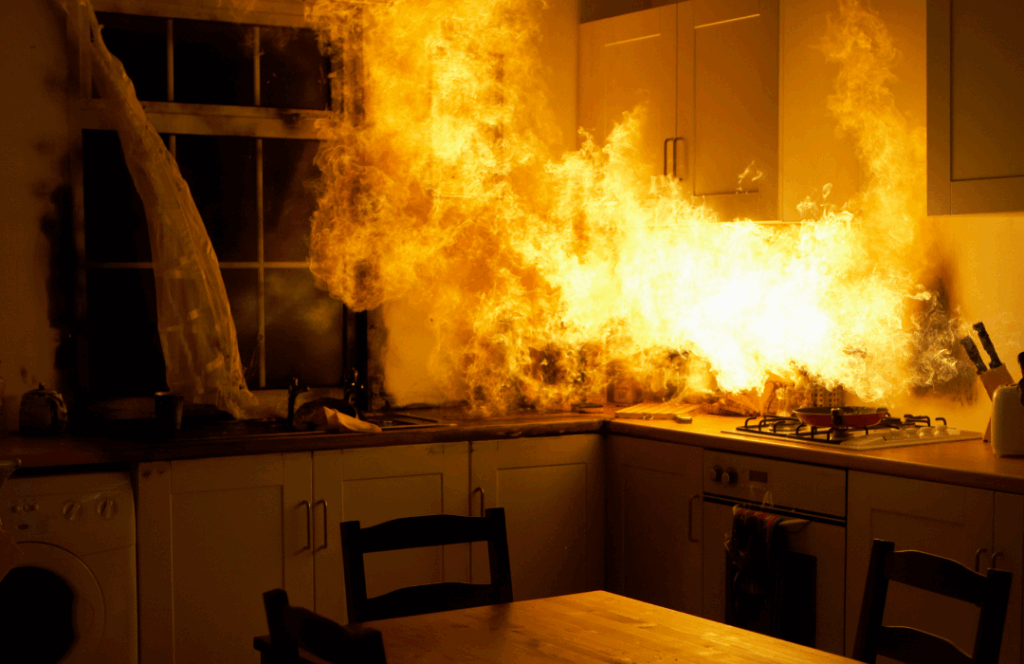
A workplace fire can be devastating. Beyond the immediate danger to people and property, the legal aftermath can be complex and costly. If a fire breaks out at your business premises, many wonder if you could personally be held liable. The answer depends on how well your workplace complies with fire safety laws, how responsibilities are delegated, and whether preventative measures were in place. In this blog, we’ll explore the legal responsibility in fire incidents at work, and how to protect your organisation from the severe consequences of non-compliance.
In the UK, fire safety in workplaces is primarily governed by the Regulatory Reform (Fire Safety) Order 2005 (often shortened to the Fire Safety Order). It applies to virtually all non-domestic premises, including offices, warehouses, factories, shops, schools, and care homes.
Under this legislation, the “responsible person” has a legal duty to ensure fire risks are managed. This role usually falls to the employer, building owner, occupier, or anyone with a degree of control over the premises. In some cases, multiple people may share this responsibility, such as landlords and tenants in multi-occupancy buildings.
Failure to meet these obligations? It is a criminal offence, with penalties ranging from heavy fines to imprisonment.
The “responsible person” isn’t just a title, it carries serious legal weight. By law, they must:
If these duties are neglected and a fire occurs, the responsible person can be held liable. For directors and managers, this means legal accountability doesn’t stop at the company, it can extend to individuals personally.

When fire safety responsibilities are overlooked, the consequences can be severe. Regulatory bodies, including local Fire and Rescue Authorities (FRAs), have the power to conduct inspections. If they find serious breaches, they can issue enforcement or prohibition notices to restrict the use of premises until safety standards are met.
If a fire actually breaks out and results in injury or death, investigations will focus on whether proper precautions were taken. With approximately 7,000 workplace fires recorded in the past year, they’re not unheard of!
If negligence is proven, directors or owners can face prosecution. A lack of fire risk assessments, faulty alarms, blocked escape routes, or untrained staff are all common failings that have led to successful prosecutions in the past.
For example, in recent years, several UK businesses have faced six-figure fines after inadequate fire safety measures led to avoidable risk. In some cases, managers were handed custodial sentences, demonstrating that liability is very real.
When determining liability after a workplace fire, several questions are asked:
The answers to these questions directly influence whether liability falls on the organisation, its directors, or both. Importantly, ignorance of the law is not an acceptable defence.
Workplace fire incidents can give rise to both civil and criminal consequences.
Criminal liability arises when laws like the Fire Safety Order are breached. This can lead to prosecution, fines, or imprisonment for the responsible person.
Civil liability involves claims brought by employees, visitors, or others harmed by the fire. If an employer is found negligent, they may be ordered to pay compensation for injuries, trauma, or losses.
In many cases, businesses face both. The reputational damage, combined with financial penalties, can be catastrophic.

While insurance plays a critical role in recovery after a fire, it does not shield businesses from liability. Insurers may refuse to pay out if it emerges that legal obligations weren’t met. For instance, if you failed to maintain certified fire alarms or didn’t carry out risk assessments, your policy could be invalidated.
This means compliance isn’t only about legal protection, it’s also about ensuring that your insurance provides the safety net you expect in the aftermath of a fire.
Avoiding liability requires more than installing equipment, it means embedding fire safety into your workplace culture. Businesses should adopt a proactive approach where fire safety is seen as everyone’s responsibility, not just the facilities manager’s.
Practical steps include:
These practices not only reduce the risk of fire but also provide clear evidence of compliance should an incident occur.
Understanding legal responsibility in workplace fire safety is not optional, but essential. The law is clear: employers and those in control of premises must take proactive steps to manage fire risks. Failure to do so exposes both businesses and individuals to serious consequences, including prosecution, fines, and prison.
By embedding a culture of fire safety, ensuring systems are certified and maintained, and keeping staff trained and prepared, you can dramatically reduce your risk of liability.

At BusinessWatch, we understand how overwhelming fire safety responsibilities can feel for business leaders. That’s why we provide end-to-end support, including:
Working with BusinessWatch ensures your workplace is not only safe but also legally compliant, helping you understand your legal responsibility in fire incidents, reducing your risk of liability and protecting your business from devastating consequences.
Fire safety isn’t just a compliance box to tick, it’s a legal and moral obligation. Don’t wait for an inspection or, worse, a fire incident to highlight shortcomings.
Contact BusinessWatch today on 0330 094 7404 to discuss fire risk assessments, certified alarm systems, and training tailored to your workplace.